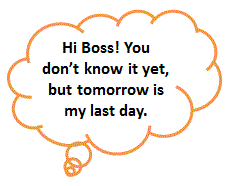Archive for March, 2015
One More Thing Before I Quit
 When you’re planning to leave your job, there’s one more thing you may want to add to your checklist.
When you’re planning to leave your job, there’s one more thing you may want to add to your checklist.
Besides saving extra money, planning for your future healthcare, making sure you leave with all the compensation you’re entitled to, and all the other tasks like getting your personal data off of your company’s computer, writing a positive goodbye email, and so on, there’s one more thing.
But only you know what it is.
Whether you’re unhappy in your current job, or just ready to move on, there’s probably something you want to accomplish before you’re done there. It could be finally learning a new skill that you had been avoiding or completing a project that gives you credibility for your next role. It could be finishing a program or product that you’ve been immersed in, and want to see through to the end.
Maybe you’re finally ready to apologize to a colleague to resolve a mistake you made in the past. It could be standing up to a workplace bully to prove to yourself that you won’t accept that kind of behavior. Or, establishing boundaries with your manager to reclaim your sense of personal power.
You know what it is. Add it to your list. Go do it.
How You Quit Matters
 When leaving a job, we all know it is best to part on good terms. You know…don’t burn any bridges. HOW you quit will stay in people’s memories long after you’re gone.
When leaving a job, we all know it is best to part on good terms. You know…don’t burn any bridges. HOW you quit will stay in people’s memories long after you’re gone.
I recommend that people set an objective for how they want to quit and be clear why it benefits them.
For example:
- Leave with a solid reputation – because it provides source of positive referrals for future companies, or the possibility of returning to your former employer.
- Exit with all of the compensation you’re entitled to – because waiting until your stock or 401K vests, or for a bonus, provides money that you may need or help cushion you through a transition.
- Quit as soon as you’ve mastered a skill, or launched a successful program – because leaving while you’re confident and proud of your work is the ideal attitude to have while launching into your next phase.
Having an objective for the way that you want to leave your job gives you something to hold onto when you’re having a particularly bad day. It is a reminder of why you aren’t storming out of the office – you’re determined to quit on your terms.
I have to note, though, that I interviewed people who reached a breaking point at work and quit suddenly. After being yelled at in front of his coworkers, one customer service representative told his supervisor that, “I will no longer allow you to treat me this way. I quit.”
Another woman I spoke with was so miserable that she couldn’t take one more day of work. She went into work, got a few things from her office, and told her manager on the way out, “I’m quitting today.”
While it is prudent to leave on good terms, the people I spoke with had no problem finding other jobs. They had felt crushed by their old jobs and standing up for themselves was a way of taking their power back. It reminded them that in fact, nobody had the right to treat them abusively.
And then there’s Marina Shifrin, who became famous for her dance video resignation letter.
Did Your Manager Go to the Dark Side?
 As I researched the topic of people quitting their jobs, I heard a lot of stories about evil managers. No surprise, right? Unfortunate employees across all industries had tales of harassment, corruption, and behavior that would be shocking if it wasn’t so prevalent.
As I researched the topic of people quitting their jobs, I heard a lot of stories about evil managers. No surprise, right? Unfortunate employees across all industries had tales of harassment, corruption, and behavior that would be shocking if it wasn’t so prevalent.
The saddest stories I heard were the ones about bosses that didn’t used to be evil. Their ex-employees told me that some of them used to be great. They were effective leaders who clearly communicated expectations and treated their staff with respect. There was mutual trust and positive manager/employee interactions.
What made these bosses go to the dark side?
- The managers’ workloads skyrocketed and they did not have the support of their own bosses.
- They were promoted to higher levels and as their egos inflated, their people skills declined.
If you have a boss who turned evil and you’re clinging to the shreds of the person he or she used to be, your odds aren’t good. I only heard one story about a bad boss who became more supportive of her staff as her home life improved. But she was one who started out evil. I didn’t find any stories of people making it back from the dark side once they crossed over.
It can be cathartic to share stories of nasty bosses, but I’d rather learn something from these scenarios. First, if you’re reporting to a bad boss, you know it probably won’t get better. Now is a good time to start planning your next career move.
Second, there’s an opportunity for self-reflection and choice. When I worked in a difficult environment and was constantly stressed, scrambling to meet last-minute deadlines, and exhausted, I didn’t have my full set of interior resources to draw upon. It took much more effort and energy to put the Dale Carnegie and Emotional Intelligence skills I’d learned to use. I had less time to help others and less patience with mistakes. I didn’t like that my behavior and attitude could be negatively impacted by my job. When I changed careers, one of my priorities was to work in environments that enabled the best version of me to show up more often than not.
Leave the evil bosses behind.
And when you grow your own career, remember the warning signs. Don’t go to the dark side.





Recent Comments